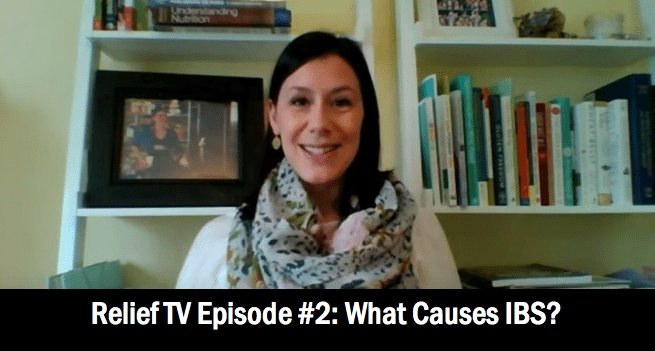Welcome back for our second episode of Relief TV! If you missed last week, click here to catch up and learn all about what Irritable Bowel Syndrome is, and how it differs from other digestive health disorders.
This episode is all about what causes IBS, the role that food has to play, and why some people experience IBS and others do not.
What Causes IBS?
When it comes to IBS, researchers and health professionals haven’t identified exactly what causes IBS, but we have an idea of what influences the onset of IBS and the start of symptoms associated with IBS (gas, bloating, distension, abdominal discomfort, diarrhea and/or constipation). What can have a role in potentially causing your IBS?
Genetics Can Influence IBS
If you have a family member with IBS, than you are more at risk of developing this digestive disorder. This is very similar to other health conditions.
Stress & Anxiety Can Influence IBS
There is a clear connection in science between stress and health; it’s no different with IBS. Whether you have had a stressful event in your life, like the death of a loved one or other type of loss, or have ongoing stress or anxiety, this can play a huge role in how your body functions and can be related to the onset of IBS.
A Bug, Infection or Illness Can Influence IBS
I’ve worked with clients for over 5 years that suffer with IBS and for many of my clients, symptoms have started with some type of illness like H.Pylori or other sickness, and then continued. Often I hear this is related to travel as well – something caught when on a trip to another country.
An Imbalance of Gut Bacteria Can Influence IBS
Researchers are learning more and more about our gut microbiome (the bacteria that lives in our digestive system). Currently we know that the amount and types of bacteria you have in your gut can contribute to symptoms of IBS.
Does Food Cause IBS?
Although food does not cause IBS, it does act as a trigger for symptoms. Certain foods can be difficult to digest, which can cause fermentation, or the creation of gas, which can then lead to unpleasant symptoms. To learn more about how food affects IBS, check out these posts:
The Best and Worst Foods for IBS
What’s All the Fuss About Fibre?
Why Do Only Some People Suffer from IBS?
There are 5 main reasons why only some people suffer from IBS, while others do not.
- How much gas the body makes. Those with IBS may have more of the type of bacteria living in the gut that makes loads of gas.
- Sensitivity of the bowels. Some people have a heightened sensation of bloating which can make you more uncomfortable.
- How well our body moves gas out. The digestive system of those with IBS often can’t move gas out of the body as efficiently as those without IBS. So it can sit in the gut for longer causing discomfort and distension.
- How well our stomach muscles tighten to prevent the abdomen from sticking out. Those with IBS may have weaker stomach muscles causing distension.
- Our awareness and perception of signals from our gut a.k.a. the brain-gut connection. For those with IBS, awareness of symptoms like gas and bloating can be higher.
IBS is experienced a little differently from one person to the next. For more information about why your mental health is so important when dealing with IBS, read this article: Don’t Stress, Digest!
Wishing you good gut health & wellness,
Stephanie and the Team

